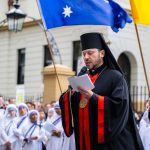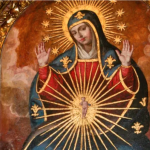Ordination – Br Bede Cannavo OSB
By Archbishop Julian Porteous
Wednesday, 3 April 2024
During the Lenten season the daily Office of Readings takes up the Book of Exodus. We follow the story of Moses and the liberation of the Chosen People from Egypt. We then follow the account of their journey down to Mount Sinai where they were to offer sacrifice.
It was at Mount Sinai that decisive events occurred by which this people were embraced as God’s Own People. A solemn covenant was established which the later prophets summarised as “I will be your God and you will be my people”.
It was on Mount Sinai amidst dramatic manifestations of the power and majesty of God that Moses received the law that was the govern Israel, the Decalogue, the Ten commandments. Then we read of the quite explicit detail concerning the construction of the Ark of the Covenant which was to be the centre for the rituals of worship.
Worship of God was central to the people’s response to entering into the Covenant with God.
In the daily Lenten readings at this point we leave the Book of Exodus and move to selected passages from the Book of Leviticus. The first reading is chosen from Leviticus, chapter 8, and concerns the consecration of Aaron and his four sons as the priestly caste for Israel. The whole community of Israel gathers to witness their consecration to priestly office.
There is much detail given about the nature of the priestly robes. For Aaron himself, the High Priest, he is robed in tunic, girdle, a pectoral, and a turban with a golden plate. This has all the marks of royal stature. His sons are similarly robed with tunic and girdle, though in a more restrained fashion. The vestments highlight the dignity of the order of the priesthood.
Next Aaron is anointed by Moses with oil, and the altar is anointed at the same time.
Then there follows three sacrifices – a sin offering, a holocaust, and a special ordination offering. Thence, Aaron and his sons assume their office and service to the spiritual needs of the People of Israel.
Aaron is given instructions as to how he is to conduct his priestly service. He is reminded always to wear the designated vestments when fulfilling his duties. He is given instruction particularly about making sin offerings as an act of atonement for himself and for the people.
Later in the Book of Leviticus there is detailed instruction as to how the people were to conduct their lives. There is a refrain that occurs several times, “Be holy as I the Lord your God are holy”. The Jewish word is “qadash”. God is holy. God is separate, inaccessible, and carries an awe-inspiring transcendence. Anything associated with God is holy.
It means that the people, as God’s own people, are to be singularly dedicated to God and separated from the influences of the world around them. As well as ritual actions, the God of Israel sets forth moral demands. The people are to live as a holy people. The particular role of the priesthood in the Old Testament is to ensure the holiness of the people, by calling them to holiness of life and by offering sacrifices in atonement for sin.
Br Bede, today as you are about to be ordained into the priesthood of the New Covenant, to share in the one priesthood of our Lord Jesus Christ, these injunctions from the Old Testament remind you of your principal task as priest.
You are consecrated to God as a priest. The Letter to the Hebrews reminds us that a priest “is taken out of mankind and is appointed to act for men in their relation with God, to offer gifts and sacrifices for sin” (Heb 5:1).
Thus, the priestly office directly involves a mediatorial role between the All Holy God and humanity. Every time you stand at the altar and offer the liturgy of worship as designated by the Church you are standing before God for the people. Through you their prayers are presented to
the Most High God.
As a priest of the New Testament you mediate the grace of the salvation won for us by Christ on Calvary. This is the power and efficacy of the Holy Sacrifice of the Mass. It is the Sacrament of the Sacrifice.
The Old Testament carried a sense of the awe and majesty of God.
This same awe and majesty should inspire the way in which you celebrate every Mass. Reverence, a sense of the sacred, a mode of silence, draw those attending to a spiritual place that enables them to be conscious of the holiness of God, and assists them in offering themselves to God as a spiritual sacrifice.
Br Bede, you are to be a priest monk. May I quote from a priest monk of the eight century who bears your name. Bede the Venerable described his life in these words, “I have devoted my energies to a study of the Scriptures, observing monastic discipline, and singing the daily services in church; study, teaching, and writing have always been my delight.” He was first of all a monk intent on living monastic life to the full.
Br Bede you are first of all a monk and the exercise of your priestly ministry will be as a monk, among your brothers first of all and, then, as the services of the monastery dictate.
In Chapter 62 of the Rule your holy founder gives clear direction concerning the role of priest monks, clearly indicating that such a monk is first and always a monk.
The monk so ordained must be on guard against conceit or pride, must not presume to do anything except what the abbot commands him, and must recognize that now he will have to subject himself all the more to the discipline of the rule. Just because he is a priest, he may not therefore forget the obedience and discipline of the rule, but must make more and more progress toward God.
Br Bede, I know that you are deeply conscious of being a monk first and foremost, now called to the dignity of the priesthood. Be an example of holiness to your brothers and may your priestly presence serve them in their own path in monastic life. And may your spiritual services draw many on the path of Christian sanctity.
Br Bede, heed the words of the Lord from the Book of Leviticus, be holy as the Lord your God is holy.









